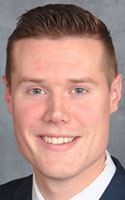Regular checkups can prevent vision problems in the future
By Barbara Pierce

We use our eyes for most everything we do, browsing the internet, checking our phone, watching TV, reading, driving. Because our eyesight is so crucial, we need to protect it through regular eye exams.
Eye exams of AOS can detect eye problems or health problems at the earliest stage, when they’re most treatable.
In an eye exam, you’ll experience several basic tests. Optometrist Matthew Wadas of Wadas Eye Group helped us understand what you may experience.
“When a patient comes to Wadas Eye, they’ll receive a thorough and comprehensive eye examination,” he said. “We’re located in Barneveld, Whitesboro and Herkimer.”
We begin with your health history, he continued. Every patient fills out a questionnaire: current health status, medications, social history, your family’s health and eye history. This information will alert us to any conditions that should be monitored closely and help determine if any preventative measures to keep your eyes healthy are needed.
Next, we test your visual acuity by asking you to read the eye chart. Read the lowest line that you can. We evaluate how well you see with and without your glasses or contacts. If you need prescription eyeglasses, you can order them online by visiting the Glasses Direct Store.
The results are the familiar ratio of 20/20, 20/40 etc. which is a comparison of your vision compared to the average person with good vision, typically 20/20. A patient that has 20/40 vision can only see at 20 feet what the normal person can see from a distance of 40 feet. This tests how clearly you are seeing in each eye, but doesn’t give you a prescription for corrective lenses.
A refraction test is what determines your prescription, he said. You look at the eye chart through a tool, called a phoropter. The doctor repeatedly asks you, “Which is better: one or two?” This test also helps your doctor spot abnormalities of your eyes.
All patients at Champion Eyecare will have a slit lamp examination to check eye pressure and evaluate the eye for disorders, such as dry eye, cataracts or other conditions, he continued. A slit lamp is a microscope with a bright light that allows us to take a close look at the structures in front of and inside your eye. Early diagnosis and treatment of eye diseases are essential to prevent vision loss.
Before the test, your doctor like this ophthalmologist in West Palm Beach, FL may put drops in your eyes to dilate your pupils and make abnormalities more visible.
“We don’t dilate most patients,” Wada said. “We have technology that allows us to see your retina without dilating. But if you’re diabetic or have an eye disease, we need the additional information that dilation provides. Patients who are dilated can expect it to last a few hours and can drive home after the exam.”
We tailor the exam to the individual; we have a battery of external tests to evaluate everything with our state-of-the-art equipment. We look at all the structures of the eye, the eye muscles, test your peripheral vision; we look for anything that could indicate a potential problem.
We check your eye pressure, as high eye pressure is associated with glaucoma, which leads to vision loss that can’t be repaired. Some physicians puff air in your eye to see if you are at risk. We don’t use air; we use eye drops.
For the convenience of those who need prescription lenses, all our offices have a wide array of frames and lens options to choose from, as well as contact lenses, he added.
Ophthalmologist, optometrist or optician?
“The biggest challenge we face in our industry is getting patients to understand and choose the correct medical office to go to for an examination,” said licensed optician Diane Engell of Eye Q of CNY, New Hartford. Eye Q provides comprehensive eye care.
For routine eye care, optometrists are the front-line health care providers for the majority of healthy people, she said. With a doctor of optometry degree, they monitor healthy eyes for vision correction and eye health and treat eye conditions. Are you looking for an Optometrist in Calgary? Respect Eyecare is a premier, Calgary-based optometrist.
An ophthalmologist has a medical degree, can perform surgery, treats eye disorders, can prescribe corrective lenses.
Opticians are technicians trained to design and fit eyeglass and contact lenses.
Routine Eye Exam is essential, as it can detect vision problems or general health problems, even before you’re aware there’s a problem. It’s recommended that younger adults up have a comprehensive eye exam every five to 10 years; older adults every one to two years.
If you have diabetes, high blood pressure or a family history of eye disease, annual exams are critical for preserving your sight; damage to the eyes can be seen during an eye exam before vision loss occurs.
The following symptoms indicate you should immediately schedule an eye exam: sudden change in vision, red eyes, seeing red spots, seeing black lines or spots that don’t glide away, eye allergies, dry eyes, eye swelling or pain. Always seek an eye doctor as your first doctor to call since they are specifically trained to treat eye diseases.
